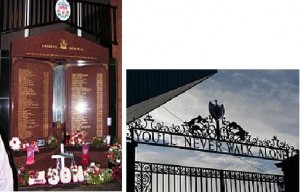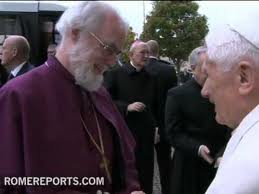One of the musical items featured in the BBC’s ‘Last Night of the Proms’, 2012, was the Rogers and Hammerstein’s song: ‘You’ll Never Walk Alone’. In the second half of the programme, it was sung by the BBC Symphony Chorus, accompanied by the BBC Symphony Orchestra, and led by the Maltese Tenor, Joseph Calea. Of course, the audience of some 6,000 ‘Prommers’ joined in this lovely anthem, and the whole sounded like one great, and glorius hymn to God. It was certainly enough to stir the senses, to get the ‘hairs standing on the back of one’s neck’, and move the stoniest of hearts.
 |
The Last Night of the Proms, 2012
The song, “You’ll Never Walk Alone” was composed for the Musical, “Carousel”, and the words read just like a hymn; in the show, it is sung by Nettie, to give courage and support to her cousin, Julie, after her husband kills himself because of his involvement in a failed robbery. Perhaps, even more famously, it became the anthem sung by football supporters of many football clubs, worldwide – most significantly – by the Liverpool FC supporters, since at least the early 60’s. The words go as follows:
“When you walk through a storm
Hold your head up high
And don’t be afraid of the dark
At the end of the storm
Is a golden sky
And the sweet silver song of the lark.
 |
Walk on through the wind
Walk on through the rain
Though your dreams be tossed and blown
Walk on walk on with hope in your heart
And you’ll never walk alone
You’ll never walk alone …. …”
In my view, this anthem has been instrumental in helping the Liverpool fans, has given them the courage to bear the pain and suffering – to bear the brunt – and come to terms with the infamous Hillsborough disaster of April 1989; Liverpool FC were at the Sheffield stadium for a semi-final match again Nottingham Forest. In the human crush that occurred at the start of the match, 96 Liverpool supporters were crushed to death and over 700 others were injured, many seriously. The incident involving so many fatalities was bad enough – the worst ever to have occurred at a football match in Britain – but this was compounded by the ‘failed’ enquiries into the causes. I say failed, because it now transpires that the official authorities, allegedly, have consistently failed, all through the years, to reveal the truth of what actually occurred, despite the repeated calls and demands of the bereaved families, desperate to know the truth surrounding their loved ones’ deaths. However, in the course of the last few months, 2012, thousands of documents relating to the disaster have been offcially released, and an independent inquiry has made public its report, setting out the actual details of what took place on that fateful day in 1989. Most importantly, that report absolves the Liverpool fans of all blame, though they were publicly castigated by officialdom in earlier reports:
“On the 20th anniversary of the disaster, government minister, Andy Burnham, called for the police, ambulance, and all other public bodies to release documents which had not been made available to Lord Justice Taylor in 1989. This led to the formation of the Hillsborough Independent Panel, which, in September 2012, concluded that no Liverpool fans were responsible for the deaths, and that attempts had been made by the authorities to conceal what had happened, including the amendment of 164 statements relating to the disaster by the police. The report prompted immediate apologies from Prime Minister David Comeron, the Chief Constable of South Yorkshire Police, David Crompton, Football Association Chairman, David Bernstein, and Kelvin MacKenzie, then-editor of The Sun, for their organisations’ respective roles. In September 2012, the Hillsborough Independent Panel concluded that up to 41 of the 96 who had died might have been saved had some failings been addressed. The report revealed “multiple failures” by other emergency services and public bodies which contributed to the death toll. In response to the panel’s report, Attorney General for England and Wales, confirmed he would consider all the new evidence to evaluate whether the original inquest verdicts of accidental death could be overturned.” |
The Liverpool ‘Shrine’ for the 96, and the Anthem above the Stadium Gates
Turning away from the injustices dealt out to the deceased fans and their families, and back to the song “You’ll Never Walk Alone”, I am quite sure in my own mind that the words of the anthem, the heart-warming tune and the way in which its singing is sure to touch all hearts, reflect a certainty that, overall, it is God’s way of helping us – even those who are, perhaps, disposed to put football before religion. As I said earlier, it always puts me in mind of a hymn, and very often it is sung in that way – reverential, with longing and with hope – even by those who may not believe. For those who do, it is, surely, a way for believers to express their trust and hope in the Lord. It is saying, we are never alone, and that God is always with us, to love us, and help us. And, who knows, He may listen, and even help the play on the football field to proceed in a certain way? And all the ‘Anfield Scousers’ in the world would not argue with that!
Walk on walk on with hope in your heart
And you’ll never walk alone
You’ll never walk alone …. …”
Socius
To view the blog in its orginal format, please visit the main blog site.




